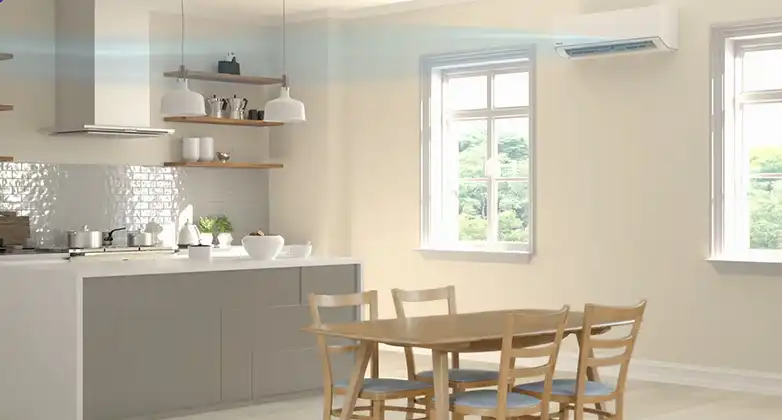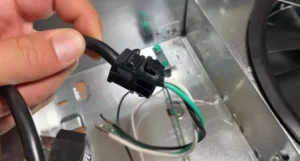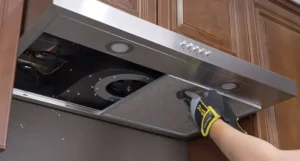Air conditioning is a common feature in many households, providing comfort during hot and humid weather. However, when it comes to using an air conditioner in the kitchen, there are several considerations and concerns that need to be addressed.
In short, yes, you can use AC in your kitchen. However, there are some precautions you must take to ensure proper cooling and longevity of the AC.
In this article, we will explore whether you can use an AC in your kitchen, the concerns associated with it, ways to address those concerns, the advantages and disadvantages of doing so, and tips for the best results.

Can You Put an AC in your Kitchen?
The short answer is yes, you can use an air conditioner in the kitchen. Many modern homes are equipped with central air conditioning systems that extend to the kitchen area. However, if your kitchen lacks central AC, you can still opt for standalone or window AC units.
What Are the Concerns of Doing It?
Even though you can do it, it’s not necessarily without its caveats. With that being said, here are some of the concerns of doing it.
Heat Load
Kitchens tend to generate a significant amount of heat from cooking appliances like stoves, ovens, and microwaves. Using an air conditioner in this environment can lead to increased energy consumption and wear and tear on the AC unit.
Grease and Odor
Cooking in the kitchen can release grease and strong odors into the air. These particles can accumulate in the AC unit’s filters and ducts, leading to reduced efficiency and potentially unpleasant smells when the AC is running.
Moisture
Kitchens are also prone to moisture buildup, especially when boiling water or using the dishwasher. Moisture can damage your AC unit and promote the growth of mold and mildew in the ducts.
How to Address Those Concerns
To enjoy the benefits of air conditioning in your kitchen while mitigating the concerns, follow these guidelines:
Proper Ventilation
Ensure your kitchen has adequate ventilation, such as exhaust fans or windows that can be opened to expel heat, odors, and moisture. Proper ventilation reduces the strain on your AC system.
Regular Maintenance
Clean and replace the AC filters regularly to prevent the buildup of grease and odor particles. Professional maintenance at least once a year can help keep your AC unit in good condition.
Dehumidification
Use a dehumidifier in the kitchen to control moisture levels and reduce the risk of mold and mildew growth.
How to Install AC in Kitchen Properly?
Choose the Right Size
Ensure the AC unit’s cooling capacity matches the size of your kitchen. An oversized unit can lead to excessive energy consumption, while an undersized one may struggle to cool the space adequately.
Positioning
Install the AC unit away from cooking appliances to minimize the intake of grease and odors. Placing it near windows for better ventilation is ideal.
Energy Efficiency
Opt for energy-efficient models with a high SEER (Seasonal Energy Efficiency Ratio) rating to reduce operating costs.
Pro Tips
Use Cooking Vents
Run your kitchen exhaust fan or hood while cooking to help eliminate heat, grease, and odors at the source.
Close Doors
Close doors leading to other rooms to prevent the cool air from escaping and to isolate the kitchen’s heat.
Smart Thermostats
Consider installing a smart thermostat for your AC unit, which can help optimize energy usage and cooling efficiency.
FAQ
Can I install a window AC unit in my kitchen myself?
Yes, you can install a window AC unit yourself if you are comfortable with the installation process and follow the manufacturer’s instructions. However, professional installation is recommended for central AC systems or more complex installations.
How often should I clean the AC filters in my kitchen?
It is advisable to clean or replace AC filters every one to three months, depending on usage and the level of contaminants in your kitchen.
Will using an AC in the kitchen affect the taste of my food?
No, using an AC in the kitchen should not affect the taste of your food as long as you maintain proper ventilation and keep cooking odors under control.
Parting Notes
Using an air conditioner in the kitchen is possible and can offer comfort and improved air quality. However, it comes with concerns related to energy consumption, maintenance, and the kitchen environment. By following the guidelines mentioned in this article and taking the necessary precautions, you can enjoy the benefits of a cool and comfortable kitchen without compromising safety or efficiency.



![Read more about the article [4 Fixes] Why Won’t My Range Hood Fan Turn Off?](https://kitchenhoodcare.com/wp-content/uploads/2023/05/Why-Wont-My-Range-Hood-Fan-Turn-Off-300x161.webp)